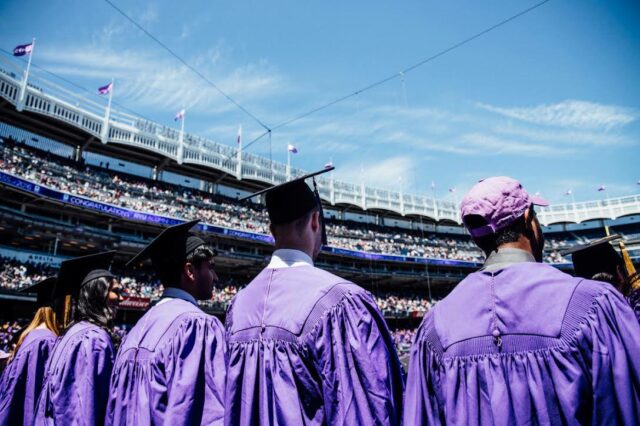By Jennifer Torres
As Wagner students know, graduate school can be an extremely difficult experience, but for first-generation students, the experience is layered with many additional challenges. In the start of my graduate career, I found myself in conversations with my peers and professors about future career opportunities. As a first-gen student, I found these conversations to be lacking key considerations that uniquely affect the first-gen community, including financial and cultural capital needed to navigate the graduate terrain. For decades, the term first-gen has been noted, but only recently have graduate programs incorporated resources to aid the first-gen graduate experience. Graduate programs, even more so than undergraduate programs, have overlooked the first-gen community, a community with a specific set of challenges who may have narrowed the earnings gap by increasing their earning power through higher education. But they continue to encounter social-class achievement gap through the pursuit of higher education as a Master’s student. Today, graduate programs must focus on the needs of first-gen students in order to provide a diverse and inclusive academic and professional experience.
At Wagner, the First Generation Student Association defines first-gen as students who are first in their families to enroll in a graduate school in the United States. The Center for First-Generation Students Success says first-gen students “may lack critical cultural capital†which helps students navigate college life through policies, procedures, jargon, and expectations. Cultural capital is the knowledge, behavior and values found in a system which can also be labeled as the dominant culture. Therefore, unequipped students may experience damaged confidence and struggle in feeling a sense of belonging when navigating the unknown graduate terrain.Â
While lack of cultural capital may lead students to feel out of place, their socio-economic status and cultural background impacts their experience, as well. In the US, 30% of the student body is first-gen. This number further breaks down to 42% being black students, 48% being Hispanic students, and 28% being white students. Historically, Black and Hispanic families earn less in the US influencing a person’s experience. The fact is, the median income of an undergrad first-gen student’s family is $37,565, compared to $99,635 for a non-first-gen peers’ family. While these numbers are representative of undergrad, graduate first-gen students experiences are comparable. Family vacations and trips to the museum, which may build on an individual’s experience and education, are not at the forefront for many first-gen families due to financial constraints. Additionally, in many households, there is a cultural expectation to care financially for family members, leading many students to work while going to school. I remember during undergrad, I worked in order to contribute to the household rent and buy groceries for my family. Today, the expectation to financially provide for my family has not changed and my mother’s retirement depends on my siblings and me. This may lead to a student facing competing priorities within their school life and family life, causing challenges in fully immersing in the academic experience.
Many first-gen students can relate to juggling school and work, which is a contributing factor to why these students complete higher education later in life. The Institute of Education and Science reported that about 20 percent of first-generation college students obtained their undergraduate degree 8 years after graduating high school. That means that if those students choose to obtain a graduate degree, their academic career is already about a decade behind their non-first gen peers. The first-gen graduate student earning-gap persists, regardless of it being narrowed from weekly average of $730 earnings for a highschool graduate to $1,200 earnings for a college graduate. The reality is that these are setbacks that, when unaddressed, can negatively affect a first-gen student’s experience.
First-gen socioeconomic and cultural hurdles create unwanted scenarios, but also foster qualities in them that are invaluable in the professional setting. First-Gen students value interdependence. They are socially responsive to the needs of a community, because they adjust well to others needs and prefer to work in groups. This is largely due to having had fewer resources and having worked collectively to achieve familial goals. Their responsibility to others’ wellbeing places them in leadership positions early in life. Due to their leadership, First-Gen students tend to be naturally outward-facing and attuned to group dynamics and needs. A majority of first-gen students have managed the college experience on their own while building endurance in uncertain situations. Collectively, they are pioneers in taking on new tasks that others have not.
What needs to be done to close the social-class achievement gap between first-gen graduate students and their non-first gen peers? In order to provide adequate support, graduate programs must provide resources that incorporate community building activities, academic enrichment, and personal development so that students can successfully transition into the graduate setting. First-Gen students competitively place in Graduate programs, yet we are still growing as individuals and professionals. Our success depends on our graduate program’s awareness of our needs and intent to address them. University cultures must do more to consider the needs of diverse students. Research has found that the simple framing of a welcome message to include values of interdependence can help students perform equally to their non-first gen peers. The authors of Difference Matters celebrate cultural difference as contextual learning, building a stronger academic environment than narrow homogenous programs, which fail to incorporate different points of view. They also write on the importance of having explicit conversations with first-gen students as early as orientation, in order to discuss tools for handling setbacks during a student’s time at school, and emphasizing that these setbacks are due to contextual factors rather than individual deficiencies. Harvard University’s administration has successfully addressed these needs with their first-gen program that front-loads support focused on community, academic enrichment, and student development.
At Wagner, resources need to be interwoven in the experience to validate the realities of first-gen students, celebrate their strengths and acknowledge their resilience. This year, I started the Wagner First-Gen Student Association. This fledgling organization is dedicated to advocating for the needs and considerations of our first-gen community. As co-chair of the First-Gen Student Association, I am dedicated to helping connect the network of students with each other and building Wagner-wide policy to ensure our concerns are visible. This student group is just a start. First-gen students’ needs are diverse, and our success will be determined through our first-gen community’s participation in partnership with Wagner to improve its offering of diverse and inclusive resources.
If you are interested in getting involved with the First-Gen Student Association, visit our site: https://wp.nyu.edu/fgsa/
Jennifer Torres is a second year Master’s student at New York University’s Robert F. Wagner School of Public Service in the Public Administration specializing in International Policy and Management. Her professional background is in program management, entrepreneurship, community development, mentoring, college access and development consultancy. Currently, she is NYU Wagner’s First-Gen Student Association co-chair.




